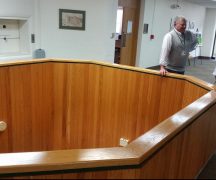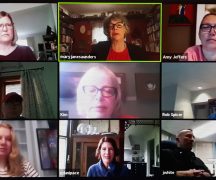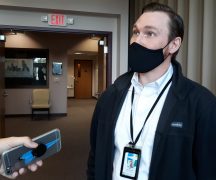By JAN LARSON McLAUGHLIN
BG Independent News
Bowling Green has seen the number of delinquent utility bills swell with the coronavirus pandemic.
Last year in April, the city had 889 delinquent customers, with a total of $360,783 in unpaid utility bills. This year, the city has 2,275 delinquent customers, with a total of $725,549 in unpaid bills.
“So obviously, the impact is affecting them directly – we all know that,” Bowling Green Public Utilities Director Brian O’Connell said Tuesday evening during the first meeting of the Board of Public Utilities since the pandemic hit in mid-March.
Even prior to the state ordering a halt to utility shut-offs and late charges, the city had already decided to not disconnect any customers’ electricity or water services, O’Connell said. The city has been extending the moratorium on cutoffs month to month, with the current waiver to end June 12.
“Obviously, we can’t continue that policy forever,” he told the board.
Since many businesses are now back in operation, O’Connell recommended that the moratorium be ended on June 12. Then, the utilities office could implement a late payment plan. Shut-offs would occur for customers not setting up agreements to pay their delinquent bills.
“These are not normal times,” O’Connell said.
Customers could find themselves with unmanageable utility bills if they don’t start paying in increments – especially with air conditioning costs coming in the summer, O’Connell said.
“Our recommendation is to allow for three-month payback arrangements,” he said.
That would give customers July, August and September to pay off their delinquent bills. But come October, the city could disconnect those not paying.
That may seem harsh, O’Connell said, but waiting longer could allow the bills to add up to impossible payments.
Waiting till November would be too late for utility shutoffs, he said.
“We don’t do shutoffs if it’s below freezing,” O’Connell said.
The city would also refer customers in need to financial assistance that is available for utility bills. In July, financial assistance (HEAP, Salvation Army) can be available to customers for the summer cooling season which may help many customers that do not typically seek financial support for utility bills. The utilities office also advises customers on how they can lower their utility bills.
Also at the meeting, O’Connell said the city’s public utilities budget has become another casualty of the coronavirus.
“We are going to experience a negative impact,” with a 25% drop in electricity sales, along with the decrease in the kilowatt tax that goes to the city’s general fund, he said.
Several of the city’s largest customers have drastically reduced their electric usage and BGSU students were sent home. The Water & Sewer Capital Improvement Fund will also see reduced revenues due to the loss of income tax.
Because the city operates its own utilities, the operations are non-profit.
“We have bills we have to pay,” O’Connell said.
O’Connell is hoping that as people return to work, the city can recoup delinquent utility charges.
“We want to be collecting as much revenue as possible by the end of the year,” he said. “This is a unique situation.”
If customers don’t pay, those delinquent charges would have to be passed on to other customers, he said.
O’Connell encouraged people who have not paid their city utilities to reach out to the city.
“If they have a hardship, call us and tell us what is happening. Maybe we could work something out,” he said.





